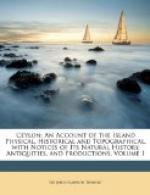The most popular sovereigns were likewise the most sedulous patrons of learning. Prakrama I. founded schools at Pollanarrua[1]; and it is mentioned with due praise in the Rajaratnacari, that the King Wijayo Bahu III., who reigned at Dambeadinia, A.D. 1240, “established a school in every village, and charged the priests who superintended them to take nothing from the pupils, promising that he himself would reward them for their trouble."[2]
[Footnote 1: Mahawanso, ch. lxxii. UPHAM’S version, vol. i. p. 274.]
[Footnote 2: Rajaratnacari, p. 99.]
Amongst the propagators of a religion whose leading characteristics are its subtlety and thin abstractions, it may naturally be inferred that argument and casuistry held prominent place in the curriculum of instruction. In the story of Mahindo, and the conversion of the island to Buddhism, the following display of logical acumen is ostentatiously paraded as evidence of the highly cultivated intellect of the neophyte king.[1]
[Footnote 1: Mahawanso, ch. xiv. p. 79.]
For the purpose of ascertaining the capacity of the gifted monarch, Mahindo thus interrogated him:—
“O king; what is this tree called?
“The Ambo.
“Besides this one, is there any other Ambo-tree?
“There are many.
“Besides this Ambo, and those other Ambo-trees, are there any other trees on the earth?
“Lord; there are many trees, but they are not Ambo-trees.
“Besides the other Ambo-trees, and the trees that are not Ambo, is there any other?
“Gracious Lord, this Ambo-tree.
“Ruler of men, thou art wise!
“Hast thou any relations, oh, king?
“Lord, I have many.
“King, are there any persons not thy relations?
“There are many who are not my relations.
“Besides thy relations, and those who are not thy relations, is there, or is there not, any other human being in existence?
“Lord, there is myself.
“Ruler of men, Sadhu! thou art wise.”
The course of education suitable for a prince in the thirteenth century included what was technically termed the eighteen sciences: “1. oratory, 2. general knowledge, 3. grammar, 4. poetry, 5. languages, 6. astronomy, 7. the art of giving counsel, 8. the means of attaining nirwana[1], 9. the discrimination of good and evil, 10. shooting with the bow, 11. management of the elephant, 12. penetration of thoughts, 13. discernment of invisible beings, 14. etymology, 15. history, 16. law, 17. rhetoric, 18. physic."[2]
[Footnote 1: “Nirwana” is the state of suspended sensation, which constitutes the eternal bliss of the Buddhist in a future state.]
[Footnote 2: Rajaratnacari p. 100.]




